The banking industry is facing a wave of transformation, driven by digital disruption, evolving customer expectations, and increasingly complex regulations. For financial institutions, keeping employees up to speed with these changes is essential, yet we’ve found that corporate eLearning for banking is still lagging in the industry.
It doesn’t have to be like that. We all know traditional training methods are costly, time-consuming, and come with a host of logistical challenges. This is where corporate eLearning comes in. A new wave of training tools and technologies provides cost-effective, scalable training for financial institutions that not only ensures compliance but also improves knowledge retention and supercharges ongoing skills development.
If you’re an L&D (Learning & Development) practitioner, business decision-maker, or HR manager in banking and finance, follow along as we explore how eLearning can address key challenges in the banking industry and why it’s a game-changer for financial institutions.
Cost-Effective eLearning for Banking Compliance Training
The banking sector involves immense risk; even the slightest mistake can cost billions. Its biggest safeguard is the compliance department, which acts like internal law enforcement. It ensures the institution complies with various regional, national, and international laws, rules, and regulatory requirements.
To this end, compliance training is non-negotiable. Banks must adhere to strict regulations. These include:
- Anti-money laundering (AML) laws
- The EU’s General Data Protection Regulation (GDPR)
- South African Protection of Personal Information (POPI) Act
- The Financial Intelligence Centre Act (FICA)
- Prevention of Organised Crime Act (POCA) and Protection of
- Constitutional Democracy Against Terrorist and Related Activities Act (POCDATARA)
- Risk management and compliance programs (RMCP)
- Anti-bribery and corruption training
- Data privacy
- Know Your Customer (KYC) guidelines
New Leaf Technologies has successfully guided clients such as Bidvest Bank through financial compliance training by introducing the aNewSpring learning platform as a solution for onboarding, compliance training, and ongoing training. Within just seven weeks, the system was set up, all software was integrated, and the platform was deployed. This allowed Bidvest to successfully roll out a mandatory Anti-Money Laundering Course to all 1200+ bank staff.
Similarly, in 2023, we successfully rolled out the POPIA course for Access Bank, and have since rolled out many more courses. Access Bank reported that attendance and course completion rates were higher than ever before, and employees’ retention of regulatory and compliance knowledge had greatly improved.
When it comes to financial compliance training at scale, you’re looking at opportunities for interactive eLearning for your finance teams that upskill them company-wide as soon as there are important changes in legislation. This ensures all your employees stay compliant without requiring frequent, costly in-person retraining sessions. For instance, a bank implementing an eLearning anti-corruption training module via an LMS for banking professionals can quickly update case studies and regulatory requirements as laws evolve, ensuring staff receive the most up-to-date information without logistical hurdles.
Addressing Skill Gaps
Advancements in fintech, artificial intelligence (AI), blockchain, and cybersecurity are constantly reshaping the banking landscape. However, not all employees have the necessary technical skills to keep up with these changes, leading to significant skill gaps within organisations.
A system that offers flexible online training for bankers helps bridge these gaps by providing tailored training on emerging financial technologies. For example, a bank rolling out a new digital banking platform can use eLearning courses to train employees on its functionalities, helping them confidently assist customers. Similarly, cybersecurity training modules can ensure that all employees—from customer service representatives to senior executives – understand data protection measures and how to recognise phishing attacks.
Another area where banking staff may experience skills gaps is in soft skills (communication, empathy, etc.) eLearning can improve the way staff communicate with customers and each other. Sales training is equally important and revolves largely around improving the customer experience and developing qualities such as transparency and accountability.
The National L&D Manager of Bidvest Bank explained that as more courses were developed, the need for prior online learning assessment and pretraining became apparent. Using aNewSpring Learning Experience Platform (LXP) as part of a blended learning experience ecosystem, staff were prompted to reach pre-determined goals and complete online assessments before moving on to classroom training.
Improving learning retention was equally important. To this end, aNewSpring allows for the integration of their MemoTrainer, a learning retention tool unique to the platform. It works on the principle that certain knowledge areas need more attention before they are stored in our long-term memory. The customisable MemoTrainer challenges learners through selective repetition and uses smart exercises to activate their knowledge. For example, the knowledge they struggle with will be shown more often, so an individual learning schedule can be created based on personal progress, detailed feedback, and specific user insights.
Interactive Simulations
Banking professionals often deal with complex and high-stakes situations, such as fraud detection, financial advising, and customer service escalations. Traditional training methods, like static presentations or lengthy manuals, do little to prepare staff for these real-world challenges.
AI-powered interactive eLearning simulations offer a far more engaging and practical approach. Scenario-based learning places employees in realistic situations where they have to make decisions that impact the outcome. For example, a fraud detection module could simulate a suspicious transaction, prompting employees to determine whether it should be flagged, reported, or investigated further. By engaging with these simulations, banking staff can develop critical thinking and problem-solving skills in a risk-free environment.
Similarly, customer service teams can undergo virtual role-playing exercises where they handle difficult client interactions. For example, a loan officer might practice explaining loan terms to a hesitant customer or resolving a complaint about bank fees. By facing these scenarios in a controlled setting, employees gain confidence and competence before dealing with real customers.

Personalised Learning
One-size-fits-all training doesn’t work in the banking industry, where employees have different roles, experience levels, and learning needs. A junior bank teller, for example, requires different training from a senior investment analyst. Traditional training struggles to accommodate these differences, often resulting in disengaged learners or wasted resources.
A robust LMS solves this issue by offering personalised learning experiences. Through data-driven insights, an LMS can track employee progress, identify knowledge gaps, and recommend tailored training courses. For example, if an employee struggles with regulatory compliance, the LMS can suggest additional refresher modules. Alternatively, if a bank launches a new financial product, the system can automatically assign relevant training materials to employees in the appropriate department.
In addition to adaptive learning journeys, gamification elements—such as quizzes, leaderboards, and achievement badges—can be incorporated to keep employees motivated and engaged. A bank could, for instance, introduce a points system where employees earn rewards for completing cybersecurity training, encouraging them to stay up to date with evolving threats.
Invest In Your Banking Teams With New Leaf Technologies
Investing in corporate eLearning for banking employees demonstrates a commitment to employee growth. Plus, eLearning is key to surviving the challenges and constant changes the banking sector faces. Contact us for a training solution that best suits your business.




